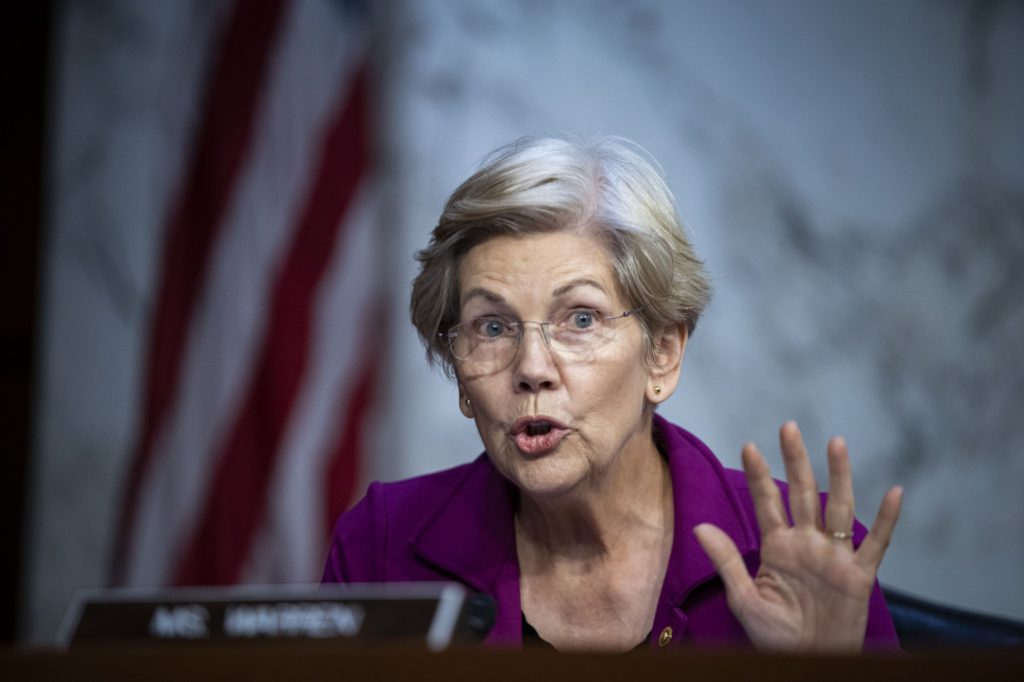Two US lawmakers are aiming to make regional Federal Reserve banks comply with public record requests after a string of scandals in the central bank system.
(Bloomberg) — Two US lawmakers are aiming to make regional Federal Reserve banks comply with public record requests after a string of scandals in the central bank system.
Massachusetts Democrat Elizabeth Warren and Pennsylvania Republican Patrick Toomey plan on Friday to propose legislation to subject the regional branches to congressional information requests under the Freedom of Information Act.
“During the largest ethics scandal in the history of the Federal Reserve system, Fed officials have stonewalled the American people and slow-walked their representatives in Congress,” Warren said in a statement.
”This bipartisan bill is a necessary response to ensure that no financial regulators can ignore congressional oversight into ethics failures, and finally deliver more transparency and accountability for any wrongdoing.”
The Fed branches are currently exempt to these requests due to their quasi-private structure.
The proposal would lift that barrier by having them considered federal agencies for the purposes of a FOIA request from a member of Congress. A spokeswoman for the central bank declined to comment on the bill.
While the bill may not stand much chance of becoming law before the end of the current Congress in early January — when Toomey leaves office — it does suggest a potential direction for future bipartisan examination of Fed reform.
It also exposes frustration among senators on both sides of the aisle in search of answers to ethics questions connected with the trading scandal that engulfed the Fed last year, and how firms get access to the Fed’s payment system.
Sarah Binder, a senior fellow at the Brookings Institution, called the legislation “the next stage in Congress’s decades-long demands for greater transparency from the Fed,” which historically has bipartisan support.
The proposal would exempt monetary policy, confidential supervisory information and personnel matters from general requests from members of Congress, though committee heads, ranking members and subcommittees could ask for supervisory and personnel files under confidentiality rules.
The “Financial Regulators Transparency Act of 2022” would also give Congress broad powers to obtain ethics-related information from the Fed and its regional banks, the Securities and Exchange Commission, the Federal Deposit Insurance Corporation and other financial regulators.
Warren has sent several letters to the Fed over the past year requesting more information on possible ethics violations, and in her most recent correspondence to Chair Jerome Powell, she said the Fed has “repeatedly refused” her inquiries.
Toomey has had multiple exchanges with the Fed about how a financial technology company called Reserve Trust obtained a Fed master account, which allows integration into the central bank’s payment system.
The account was later revoked.
“The Fed and regional Fed banks, despite being creatures of Congress, obstruct congressional oversight inquiries all too often,” Toomey said in a statement.
“In light of this persistent refusal to comply with reasonable requests for information from both Republicans and Democrats, I’m glad to join with Senator Warren in pursuing reforms that will compel these public institutions to be more transparent and accountable to the American people.”
Former Fed governor Sarah Bloom Raskin was a Reserve Trust board member and her role in the Fed master account application was part of Toomey’s inquiry.
She was nominated by President Joe Biden to become Fed vice chair for supervision, but withdrew from consideration after it became clear she didn’t have the votes to be confirmed.
The bill would also make the Fed’s Inspector General an appointment of the president and subject to Senate confirmation.
Currently, the inspector general can be hired by the Fed chair and fired by a Fed Board majority.
The Fed IG is currently reviewing the trading of current and former Fed officials, and earlier this year cleared Powell and former Vice Chair Richard Clarida of ethics violations.
Binder said the change in the IG appointment process would extend “Congress’s investigatory powers right into the Fed, possibly toughening the IG’s authority and willingness to challenge the Board.”
–With assistance from Molly Smith.
(Adds comment from Brookings scholar in seventh and final paragraph)
More stories like this are available on bloomberg.com
©2022 Bloomberg L.P.











